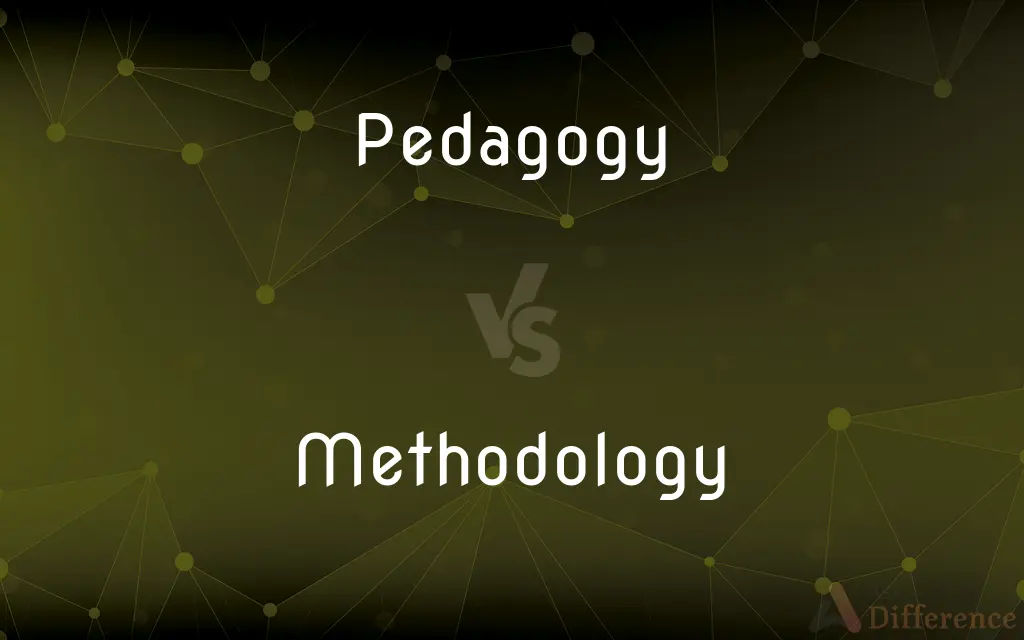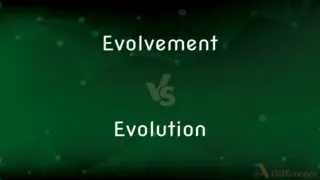Pedagogy vs. Methodology — What's the Difference?
By Tayyaba Rehman — Updated on August 21, 2023
Pedagogy focuses on the art or science of teaching, while methodology refers to the specific methods or techniques used in teaching or research.

Difference Between Pedagogy and Methodology
Table of Contents
ADVERTISEMENT
Key Differences
Pedagogy is the broad term that refers to the art, science, or profession of teaching. On the other hand, methodology refers to the specific methods, tools, or techniques employed in teaching or conducting research. It's more about the 'how' than the 'why.'
When an educator speaks about pedagogy, they often refer to the philosophy or approach behind teaching a particular subject or skill. It takes into account the broader context like the learner's background, environment, and the goals of education. Methodology, in contrast, zeroes in on the actual techniques and methods that the educator will use to facilitate learning. For instance, an instructor might believe in student-centered learning (pedagogy) and choose to use group discussions or project-based assignments (methodology) to foster that.
In the realm of pedagogy, educators might discuss topics like the importance of nurturing a growth mindset, understanding different learning styles, or the role of feedback in learning. These ideas shape the broader framework of educational practice. Meanwhile, in discussions about methodology, the focus shifts to the practical aspects of instruction: whether to use quizzes, lectures, simulations, or case studies to impart knowledge or skills.
Pedagogy is the overarching philosophy or theory of teaching, answering the "what" and "why" of education. Methodology deals with the tangible, answering the "how" of teaching by detailing the specific methods or techniques used.
Comparison Chart
Nature
The art, science, or profession of teaching.
Specific methods or techniques used in teaching.
ADVERTISEMENT
Focus
Broader educational philosophy and approach.
Practical techniques and tools.
Examples
Constructivism, behaviorism.
Quizzes, group discussions, lectures.
Application
Universal principles of teaching and learning.
Subject or context-specific methods.
Discussion
Deals with why and what of teaching.
Focuses on the how of teaching or research.
Compare with Definitions
Pedagogy
The art or practice of teaching.
Her pedagogy emphasizes hands-on learning experiences.
Methodology
The specific techniques used to convey knowledge or conduct research.
His methodology involved using a mix of lectures and interactive sessions.
Pedagogy
The science behind educational theory and practice.
Modern pedagogy has evolved to prioritize student-centered approaches.
Methodology
Methodology is "'a contextual framework' for research, a coherent and logical scheme based on views, beliefs, and values, that guides the choices researchers [or other users] make".It comprises the theoretical analysis of the body of methods and principles associated with a branch of knowledge such that the methodologies employed from differing disciplines vary depending on their historical development. This creates a continuum of methodologies that stretch across competing understandings of how knowledge and reality are best understood.
Pedagogy
A method or approach to teaching.
His unique pedagogy involves incorporating music into every lesson.
Methodology
The strategies and steps followed in the investigation or research process.
Critics questioned the methodology of the poll given its inconsistent results.
Pedagogy
The study of how knowledge and skills are imparted in an educational context.
The course delves deep into the foundations of pedagogy.
Methodology
A set of methods employed in a particular discipline or field.
The study’s methodology was clearly outlined in the introduction.
Pedagogy
The strategies and style adopted by educators to help learners grow.
Her pedagogy was influenced by years of experience teaching abroad.
Methodology
The branch of philosophy that analyzes the principles and procedures of inquiry in a particular discipline
Pedagogy
Pedagogics; pedagogism.
Methodology
The systematic, theoretical analysis of methods applied to a field.
The methodology behind the experiment has been peer-reviewed.
Pedagogy
Pedagogy (), most commonly understood as the approach to teaching, is the theory and practice of learning, and how this process influences, and is influenced by, the social, political and psychological development of learners. Pedagogy, taken as an academic discipline, is the study of how knowledge and skills are imparted in an educational context, and it considers the interactions that take place during learning.
Methodology
A particular procedure or set of procedures.
The teacher introduced a new methodology for problem-solving.
Pedagogy
The method and practice of teaching, especially as an academic subject or theoretical concept
Subject-based pedagogies
The relationship between applied linguistics and language pedagogy
Methodology
(loosely) A collection of methods, practices, procedures and rules used by those who work in some field.
Agile methodology
Pedagogy
The art or profession of teaching.
Methodology
The implementation of such methods etc.
Pedagogy
Preparatory training or instruction.
Methodology
The science of method or arrangement; a treatise on method.
Pedagogy
The profession of teaching.
Methodology
A system of methods used in a particular area of study or activity
Courses in research methodology and practice
A methodology for investigating the concept of focal points
Pedagogy
The activities of educating, teaching or instructing.
Methodology
A body of practices, procedures, and rules used by those who work in a discipline or engage in an inquiry; a set of working methods
The methodology of genetic studies.
A poll marred by faulty methodology.
Pedagogy
The strategies or methods of instruction; an educational philosophy.
Methodology
The study or theoretical analysis of such working methods.
Pedagogy
The principles and methods of instruction
Methodology
The branch of logic that deals with the general principles of the formation of knowledge.
Pedagogy
The profession of a teacher;
He prepared for teaching while still in college
Pedagogy is recognized as an important profession
Methodology
The study of methods used in a field.
Research methodology
Pedagogy
The activities of educating or instructing or teaching; activities that impart knowledge or skill;
He received no formal education
Our instruction was carefully programmed
Good teaching is seldom rewarded
Methodology
The system of methods followed in a particular discipline
Common Curiosities
What is pedagogy?
Pedagogy is the art, science, or profession of teaching, encompassing the theories, principles, and practices that drive educational actions.
How do educators choose the right pedagogy?
Educators consider learner backgrounds, goals of education, and current educational research when determining their pedagogical approach.
How do pedagogy and methodology differ in focus?
Pedagogy deals with the broader philosophy or approach behind teaching, while methodology zeroes in on the practical techniques and methods employed in instruction.
Are there universally agreed-upon best practices in pedagogy and methodology?
While certain principles are widely accepted, the diversity in learners, contexts, and cultures means that there isn't a one-size-fits-all answer in either pedagogy or methodology.
Can a teacher's methodology be influenced by their pedagogy?
Yes, a teacher's chosen methodology is often directly influenced by their pedagogical beliefs and philosophy about teaching and learning.
Why is methodology important in research?
Methodology outlines the steps and techniques used in research, ensuring reliability, validity, and clarity in the process.
What is methodology?
Methodology refers to the specific methods, tools, or techniques employed in teaching or conducting research.
Do pedagogy and methodology evolve over time?
Yes, as educational research progresses and societal needs change, both pedagogical theories and teaching methodologies can evolve.
Can one's pedagogy remain consistent while changing methodology?
Absolutely, an educator might maintain a consistent pedagogical philosophy while varying their methods based on context, resources, or student needs.
How do institutions influence an educator's pedagogy and methodology?
Institutions can set curricular standards, offer training, and provide resources, all of which can shape an educator's approach to teaching and the methods they use.
Share Your Discovery

Previous Comparison
Magpie vs. Penguin
Next Comparison
Evolvement vs. EvolutionAuthor Spotlight
Written by
Tayyaba RehmanTayyaba Rehman is a distinguished writer, currently serving as a primary contributor to askdifference.com. As a researcher in semantics and etymology, Tayyaba's passion for the complexity of languages and their distinctions has found a perfect home on the platform. Tayyaba delves into the intricacies of language, distinguishing between commonly confused words and phrases, thereby providing clarity for readers worldwide.















































